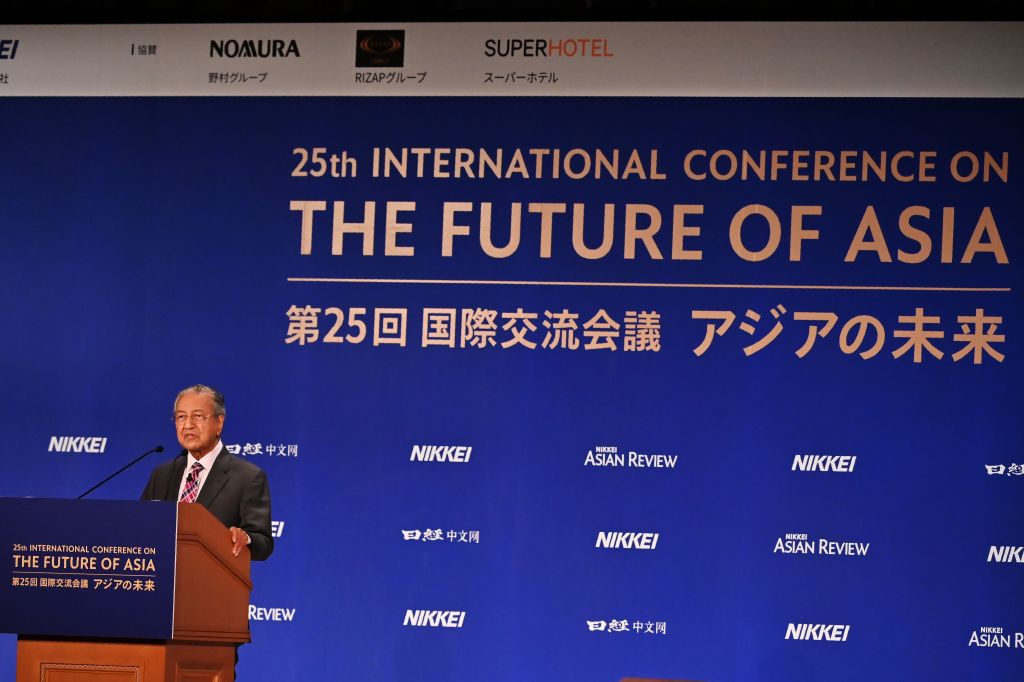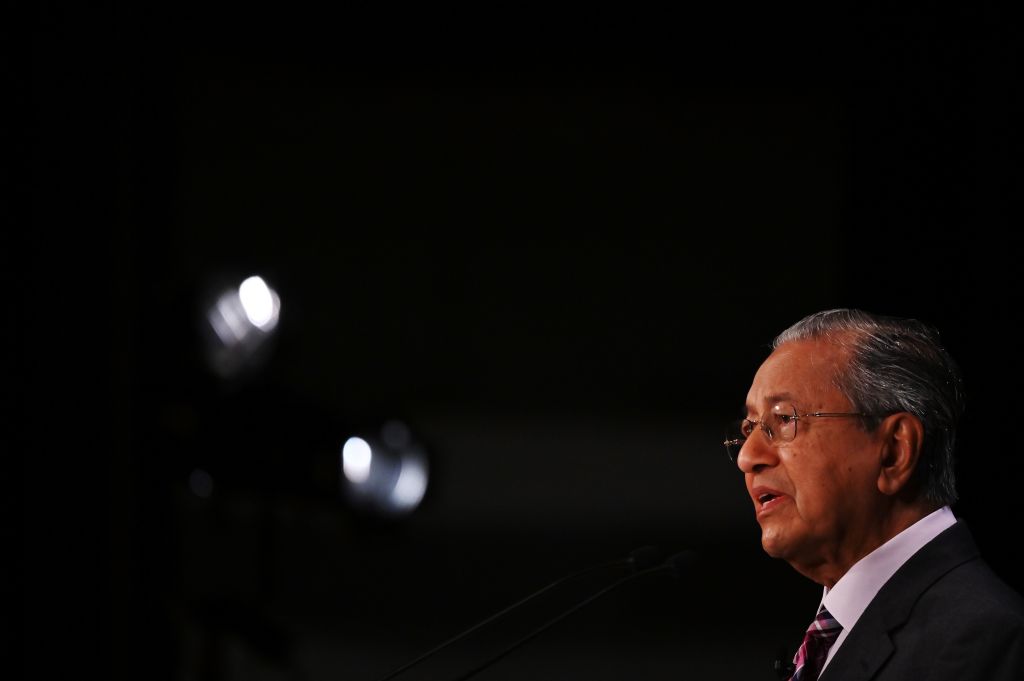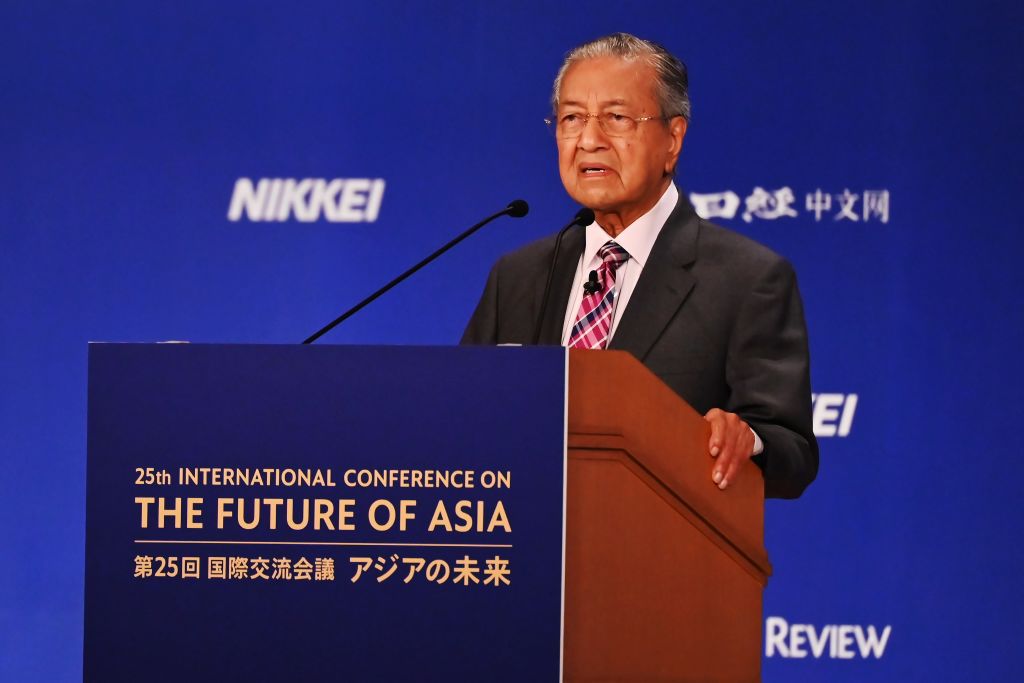REPORTING FROM TOKYO
Mahathir Mohamad continues to headline the Nikkei Conference in Tokyo in his second return as Malaysia's prime minister.
He was the first leader to deliver a keynote address at the Nikkei conference, also known as the International Conference on the Future of Asia.
It is also the 21st time he is attending the Nikkei Conference since its inception in 1995.
The theme this year is "Seeking a New Global Order – Overcoming the Chaos".
Hosted by Nikkei Inc annually since 1995, the Nikkei Conference invites government and business leaders to share their perspectives on the future of Asia and is considered one of the most important global conferences in Asia.
 Photo by Charly Triballeau, AFP, Getty Images.
Photo by Charly Triballeau, AFP, Getty Images.
Mahathir becomes ASEAN salesman
Mahathir began his speech by telling his audience that he is "very glad to be here again".
In his maiden trip to Japan as PM last year, Mahathir marketed Malaysia to the government and business leaders in Japan at the Nikkei conference.
This time, Mahathir morphed into Asean (Association of Southeast Asian Nations) salesman and statesman, in the backdrop of rising tensions between the United States and China.
"We need to settle our problems, not through war, but through negotiation, through arbitration, and through a court of law. If we do this, then the world will be much more stable and conflicts can be better resolved.
I would like to show the example of Asean, the Asean countries. When we became independent, there was confrontation, serious confrontation between Indonesia and Malaysia, claims and counter-claims, over-lapping claims between Malaysia and Singapore, Malaysia and the Philippines, and even with Thailand.
But as you know Southeast Asia now is very stable and very peaceful. No confrontation and no wars against them. They have decided to come together, particularly the heads of government. They regularly meet every year and settle whatever problems they have at the table, not in the battlefield.
Since then, Southeast Asia has been able to remain very peaceful, and our economies have benefited much from the peacefulness and stability of the Asean grouping of 10 countries."
Mahathir added that if one were to "apply that same situation or the same method of settling problem between nations", then there will be no war, or a talk of war or conflict between the United States and China.
Asean as examples
 Photo by Charly Triballeau, AFP, Getty Images.
Photo by Charly Triballeau, AFP, Getty Images.
Mahathir cited two examples on how Asean countries resolved their disputes and conflicts.
He said that if countries cannot decide on the sacrifices to be made during disagreements by themselves, they should go to the court of law and let the court decide.
In the first example, Mahathir used the issue of Pedra Branca to make his point.
"This was the case in the conflict between Malaysia and Singapore over islands. These islands were definitely Malaysian islands, nobody can dispute that. But the court says it belongs to Singapore. So what do we do?
We accede to the decisions of the court".
In the second example, Mahathir said that it was the same between Indonesia and Malaysia, where there was overlapping claims between he two countries on two islands.
He said that the court decided that the islands belonged to Malaysia and Indonesia, and despite feelings of unhappiness, both countries accepted the decision from the court.
Mahathir quipped that there "is the way of civilised people".
Three-day working visit to Japan
 Photo by Charly Triballeau, AFP, Getty Images.
Photo by Charly Triballeau, AFP, Getty Images.
Mahathir is on a three-day working visit to Japan from May 28 to 31.
He is scheduled to meet Japanese Prime Minister Shinzo Abe on May 31 for a bilateral meeting.
The Malaysian PM will also attend the Malaysia-Japan Business Dialogue to meet more than 20 top Japanese companies.
He will deliver a keynote address on Malaysia-Japan future relations and policy direction to attendees at the Foreign Correspondents’ Club of Japan.
Photos from Getty Images.
If you like what you read, follow us on Facebook, Instagram, Twitter and Telegram to get the latest updates.
